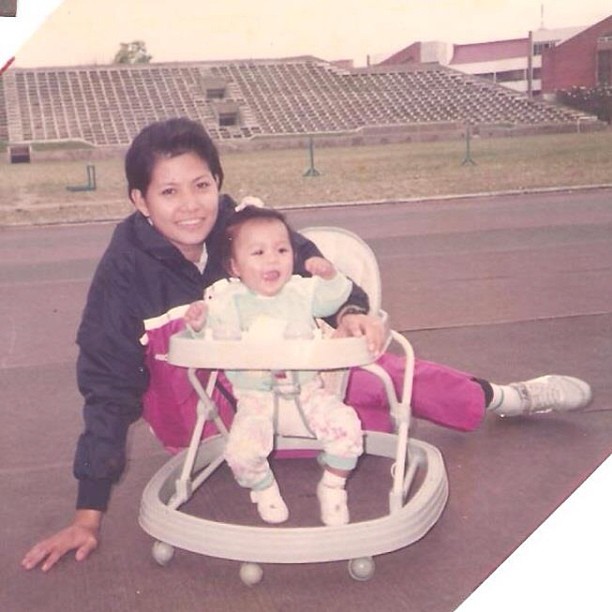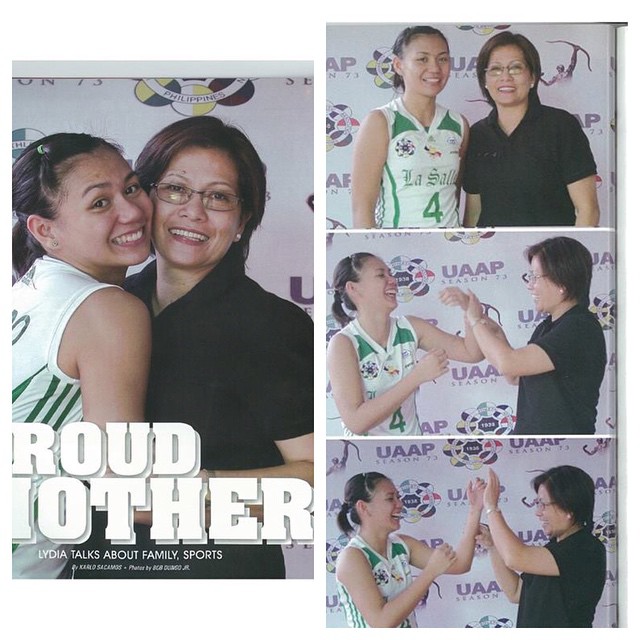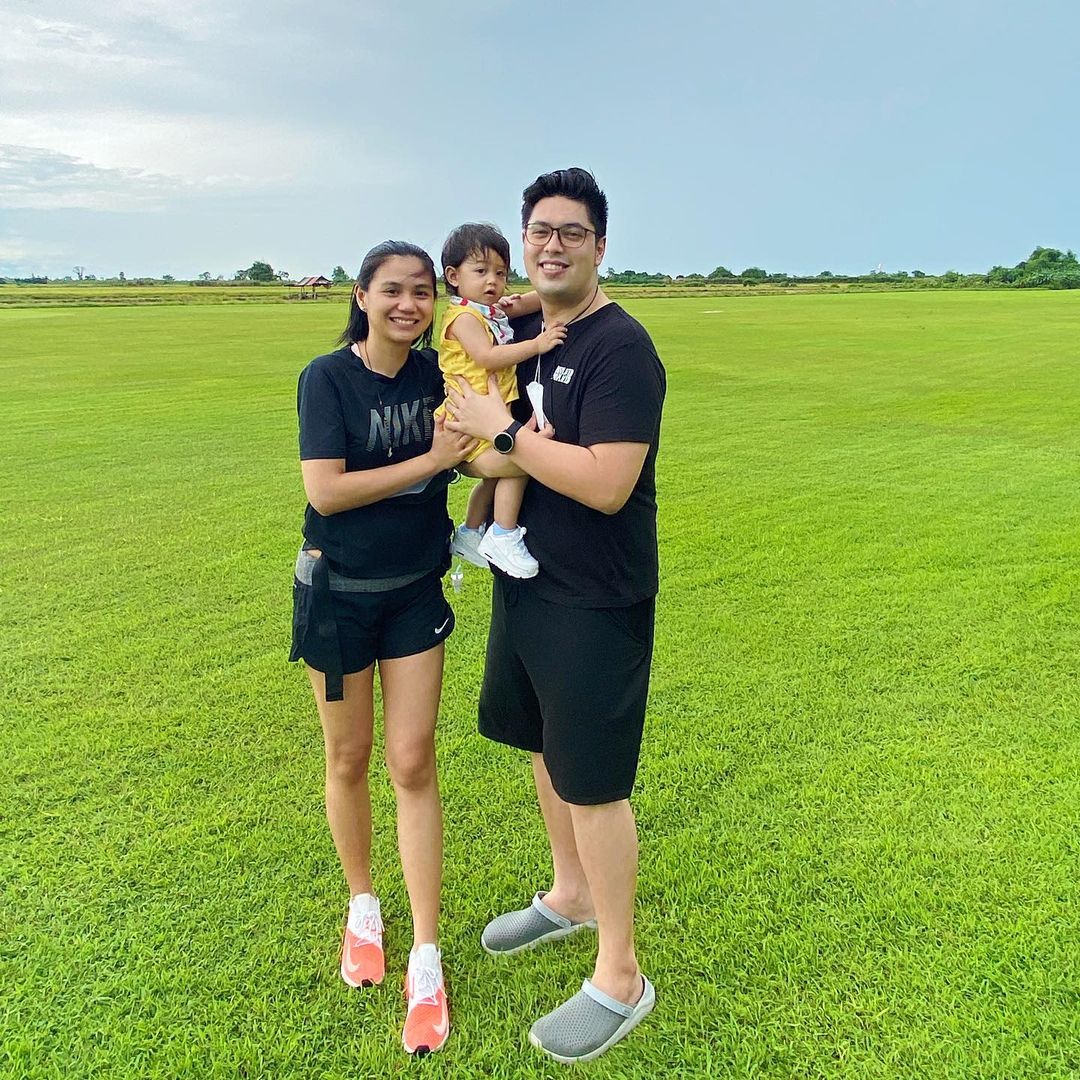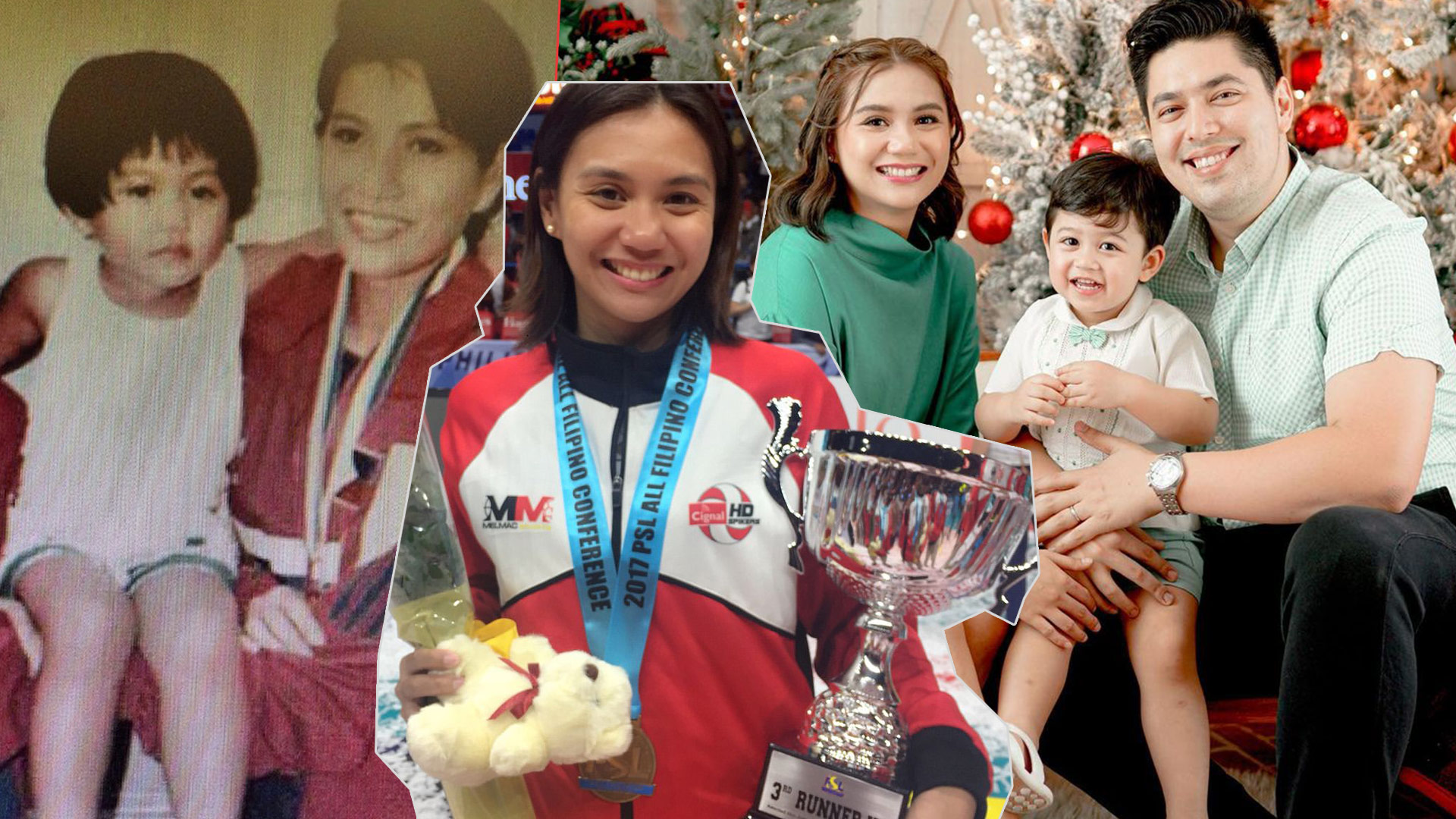Raised by Asia’s Sprint Queen, Stephanie Mercado de Koenigswarter is now a parent herself and is bringing up her kids with the values of an athlete.
Everyone knows that Lydia de Vega was hailed as Asia’s fastest woman in the 80s and 90s, an era where she won nine gold medals from the Southeast Asian Games, two from the Asian Games, and four from the Asian Athletics Championships — not to mention that she was also a two-time Olympian. It’s no wonder why she was granted the title of Asia’s Sprint Queen. But, to Lydia’s daughter, Stephanie Mercado-de Koenigswarter, her mother goes by a different moniker.
“I call her my number one basher,” she said with a laugh, cheerfully reminiscing about her memories with her late mother.
Having been exposed to sports her whole life, Stephanie grew up as an avid athlete herself. Though she did not follow in the speedy footsteps of her mother, Stephanie made a name for herself in the volleyball world, rising to stardom when she won three UAAP championships during her stint as a DLSU Lady Spiker. But even as she was navigating an entirely different sport on her own, her mother’s presence would never hide in the shadows.
Stephanie recalls that throughout her collegiate playing career, her mother would always be the first to send her a message after every game.
“I would always get text messages from her even when I was still in the locker room,” she told The GAME. “Of course, she would congratulate me when we would win, and when we’d lose, she’d say it’s okay, make up for it next time. But right after that, she’d tell me things like, “Your serve was so weak, ano ba ‘yan,‘ or ‘Your receive could be better’ — things like that. Typical mom-daughter relationship with banter.”
This is why she jokingly refers to her own mom as her biggest basher.
But even with this kind of banter, the former volleyball pro doesn’t fail to highlight that Lydia, having been a successful national athlete herself, would always look back at her own experiences and share her wisdom freely, as any loving mother would do.
Now, as Stephanie is a mother of two — her youngest only a month old as of writing — she reflects upon the values Lydia imparted to her with much more clarity as she charts her own journey of motherhood.
Growing up with sports
For many athletes raised by athletes who were uber-successful in their field, this can be both a blessing and a curse. Sometimes, second-generation athletes can feel a sense of pressure to live up to the standards set by their parents. But thankfully for Stephanie, being raised by Asia’s Sprint Queen only seemed to come to her as a blessing.
Stephanie has been immersed in the sports world for as long as she can remember.
“I was really exposed to sports through my mom because when I was younger, she’d take me to her trainings either in Rizal Memorial Stadium or in Ultra. I saw pictures before of me as a baby in a walker on the oval,” she recalled.
Even when Stephanie was out of her walker, Lydia would still bring her to everything — competitions, training sessions, and even when she was retired, she would bring her to events where she would act as the announcer.

But despite being immersed in the track-and-field scene her entire childhood, she shared, “It never crossed my mind to be a track-and-field athlete. I don’t know why, I didn’t enjoy it.
“But because of that early exposure to sports, I wanted to be more athletic and try other sports. So they made me try swimming, badminton, tennis. I tried all kinds of sports until I finally tried volleyball, and that’s where I focused.”
Interestingly enough, it wasn’t any kind of formal training that got Stephanie hooked on volleyball, despite growing up with access to the sports world. But as a 90s kid, Stephanie highlighted that many of her happiest memories as a kid were playing with her neighbors in the street. “Patinetero, agawang base, games like that,” she said.
So when her mom bought her a volleyball and a net, she shared them with her neighbors. “We would hang the net on our gate and hang the other side on our neighbor’s, and so we would just play in the street. I had fun.”
Stephanie recalled that sometimes, their games would even reach 20 players, with 10 per side. It was all fun and games. “I had no formal training at all. I didn’t join any summer camps, so it was really right outside our house where I learned to play with my friends. And then, I joined the tryouts in high school, and I got in, and that was my first formal training. That’s where it started.”
And from there, her mom was with her every step of the way.
Keeping her on track
Lydia de Vega was a dedicated athlete, and it showed in many different colors — specifically bronze, silver, and gold — and so she knew the sweat and tears that come with being competitive. But even so, when she noticed that her daughter started to become more competitive as a high school volleyball player at the cost of her academics, she made sure to rectify the situation.
“There were a lot of times when my mom wouldn’t let me join our training because I was not that good at academics,” she revealed. “So she would say, ‘Okay, if you fail again this quarter, you can’t train until you pull your grades up.”
Stephanie admitted that she did not enjoy solving math problems nearly as much as she enjoyed volleyball. Her sport became her passion, and at that age, she may have leaned too far in that direction that she lost focus on her other priorities. But her mother was there to guide her back.
“I really wanted to play volleyball, but if I focused on volleyball, I’d leave behind my academics, so she told me I have to balance it out. Not because I want something else, I forget all my other priorities. So because I wanted to keep training, I even told her, ‘I need a tutor, I need help, I need additional hours with my teacher so I can learn this.”
Finally coming to an understanding that being an athlete is a balancing act, she managed to get back on track with her academics and keep it that way all while playing well — so much so that she was recruited to join the reputable De La Salle University women’s volleyball program. And even then, her mom’s presence in her life never changed, not even when she moved to Singapore.

When Stephanie was a freshman at DLSU, Lydia moved to Singapore for work, and she recalled, “All my collegiate and professional life, she was in Singapore.”
But even while she was overseas, Asia’s Sprint Queen always made sure to tune into her daughter’s matches online. This was how she remained, as Stephanie put it, her ‘Number 1 Basher’ — watching her games from Singapore, she would still never fail to share her thoughts.
“But other than that, whenever we would talk about my career, she would always have advice,” she shared. “There were really a lot of times where I wanted to give up because training was hard, I wasn’t getting enough playing time, and for me, after more than 10 years of playing, of course, I made a lot of sacrifices.
“But my mom was always there to help me realize that this doean’t last forever. You only get to be a professional once in your life, your body won’t be able to handle this forever, and there will come a time when your mind wants to keep going, but your body won’t be able to follow. So she told me that no matter how hard it was, do not quit.”
Among the many values that Stephanie learned from her mom, this was one of the biggest that she highlights: discipline. And now that the former Lady Spiker is raising her own kids, she hopes that she can impart the same kinds of values to her little ones.
Passing the legacy
Stephanie and her husband, David de Koenigswarter, were both former athletes at DLSU (in fact, they met at the sports complex on campus) who shared a similar upbringing.
“My husband tried different sports too. He played table tennis, football, and tennis, but he focused on tennis,” she shared.
“So now, we’re on the same page in raising our kids and as early as now, our eldest, who is three years old, we are trying to expose him to different sports. He tried football, now he is taking swimming lessons, and then we will start enrolling him in tennis, because we watched my husband play tennis a few nights ago, and he liked it.”

With their youngest, who is only a month old as of this writing, they plan to do the same, as she explains, “We’ll introduce them to all sports and then it’s up to them to decide what they want, and we’ll just support. We’ll be full support no matter what they choose.”
Both Stephanie and David know that sports can provide so much value to an individual. Fitness, a good work ethic, teamwork — the list could go on.
“I want my kids to work hard to reach their goals, respect yourself, your teammates, your coaches, and win or lose, you always have to be humble…You should be gracious in defeat and learn how to stand up again from falling,” she said.
But, of course, much of this is rooted in the very value that Stephanie learned from her own mother: a deep sense of discipline.
“As early as now, our eldest, we’ve been teaching him how to be disciplined,” she revealed. “But we always make it a point to explain why. We don’t want to tell him, ‘No you cannot do this just because you can’t.’ We don’t want that. It takes a lot of patience, but hopefully, when he gets older, he’ll hold onto that value.
“There will be a lot of challenges, definitely. Up to now, I remember the things my mom used to say to me, so in the same way, I hope that’s what I can give to my kids when they grow up.”
Now that her eldest son is eager to get into the sports world, Stephanie knows from her own experiences that this will come with its hurdles. But, all she can do is support her kids every step of the way, impart wisdom to them, and hope that they will gain the same values she did.
After all, she learned from the best.
“Once you have a good foundation — like me, I learned a lot from my mom — that stays with you your whole life.”
Images from Stepghanie Mercado-de Koenigswarter on Instagram.
Related Stories:
The Real MVP: Susan Teng and Being a Basketball Mom
5 Filipina Athletes Who Are Scoring Big At The Mom Game
Setting The Standard: Kim Fajardo Has Mastered The Comeback
